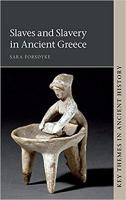
CUP (2021) p/b 277pp £18.99 (ISBN 9781107658899)
It is widely acknowledged that the sources for slavery in antiquity predominantly represent the views of slave owners, rather than the enslaved individuals themselves. This lack of first-hand accounts from ancient slaves presents a persistent challenge when approaching their subjective experiences; a challenge that is too often left untested. Sara Forsdyke’s analysis of ancient Greek slavery makes a refreshing change in this respect by attempting to compare the available evidence from antiquity with that of later slave owning societies in order to reconstruct the slave experience from the perspective of the individual.
The wider subject of slavery is considered first, asking what we mean by the term ‘slavery’ and how that was understood in Greek thought. Then follows a broadly chronological journey through the lifetime of a slave, looking first at the enslavement process, what is known of the slave population in Greece and then detailing the various subsequent stages of enslavement such as their various roles, public slaves, language, family, religion and ending with resistance and freedom. An initial consideration of how we approach the topic of ancient slavery also highlights the various sources that are available, the difficulties that arise in their interpretation, and the complex definitions (ancient and modern) for both slavery itself and the individuals who were subjugated. Forsdyke casts a wide net in gathering evidence, encompassing an impressive range of literature, drama, epigraphy, material culture, legal records and rhetorical speeches. This gives the reader a solid appreciation of the pervasiveness of slavery in Greek society and a comprehensive overview of the subject.
The discussion on slave religion, religious sanctuary and the opportunity for slaves to change their ownership is particularly illuminating. F. marshals evidence from a wide range of sources to craft a compelling argument for the manner in which slaves could take advantage of these institutions to improve their circumstances and demonstrate a level of autonomy that is rarely appreciated. Likewise, further points about slave resistance reveal some interesting legal examples of theft and slaves defending themselves against their owner’s accusations—giving the slaves a voice that often remains unheard.
However, in attempting to access that voice, there are too many occasions where the discussion relies on hypothetical possibilities. Even when the source is explicit, it is occasionally misrepresented. A discussion in chapter 5 on slaves’ fluency in Greek language relies heavily on an excerpt from Demosthenes (57:18-19) that is presented as evidence that a foreign accent was a marker of slave status. However, the source in question is concerned with ascertaining the citizen status of the speaker, whose father’s foreign accent (acquired during enslavement) brought his citizen status into question. Indeed, the line between metic and slave is often blurred in this analysis. This paints a vivid picture of Greek life at the lower end of the social scale but is ambiguous in defining the slave experience.
Likewise, there are occasions when the use of later sources ceases to be comparative and instead applies them as direct evidence for ancient Greek slavery. In one case from chapter 2, the treatment of slaves in the marketplace of 19th C New Orleans is presented as likely to have also happened in Greece, simply by virtue of it having happened in America. F. does acknowledge in her concluding chapter that she occasionally requires ‘liberal use of the imagination’ from her readers, but this weakens the depiction of slavery and the associated arguments.
There is enough ancient evidence used throughout the book to make this an informative overview of Greek slavery, and this is therefore a useful addition to the ‘Key Themes in Ancient History’ series by Cambridge University Press. However, whilst new approaches to the study of ancient slavery are to be welcomed, the comparative angle adopted here is too eager to accept unsubstantiated similarities between different slave societies. This ultimately requires a more critical mind from the reader, in order that the imaginative element is not accepted as a de facto account of how Greek slaves contextualised their own experience.
Jamie Young
